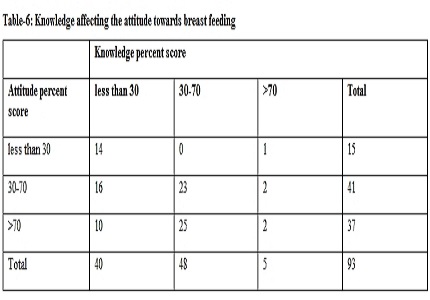Father’s knowledge and attitude towards breast feeding
Abstract
Introduction: A father’s knowledge and attitude towards breastfeeding are very important for the success of breastfeeding practices. There is no uniform practice of including them in the education sessions in our country.
Objectives: To assess the knowledge and attitude towards breastfeeding among fathers of infants aged 6 months to 2 years attending well baby clinic.
Material and Method: A cross sectional study with convenient sampling was conducted on 93 fathers. A self-administered, pretested and pre-validated questionnaire with regards to breastfeeding practices was then distributed among the fathers.
Results: 93 respondents completed this study. 70 fathers (75.3%) had babies exclusively breast fed between 4-6 months of age. 54 fathers (58.1%) had knowledge about breastfeeding before baby’s birth and 68(73.1%) were keen to get more information after baby’s birth. 90 fathers (96.8%) felt that they got required information , but only 34 (36.6.%) had received education from health care providers. Knowledge regarding exclusive breastfeeding (n=84), breast milk superiority,(n=86), emotional bonding created by breastfeeding (n=70) was adequate in most. Father’s age, education status, occupation, family type had no influence on knowledge or attitude. Father’s whose child was born by caesarean section or had co morbidities in neonatal period had better knowledge and positive attitude. Fathers with better knowledge had positive attitude towards breastfeeding, but this had no influence on duration of exclusive breastfeeding.
Conclusion: Father’s knowledge was positively affected by health care exposure and education. Fathers with good knowledge had positive attitude towards breast feeding. Hence they should be included in discussions regarding breastfeeding in antenatal counselling.
Downloads
References
World Health Organization . Infant and young child feeding: model chapter for textbooks for medical students and allied health professionals. Geneva: World Health Organization; 2009.
Chandhiok N, Singh KhJ, Sahu D, Singh L, Pandey A. Changes in exclusive breastfeeding practices and its determinants in India, 1992-2006: analysis of national survey data. Int Breastfeed J. 2015 Dec 29;10:34. doi: https://doi.org/10.1186/s13006-015-0059-0. eCollection 2015.
Tan K. Factors associated with exclusive breastfeeding among infants under six months of age in peninsular Malaysia. Int Breastfeed J. 2011;6(1):2. doi: https://doi.org/10.1186/1746-4358-6-2.
Agho KE, Dibley MJ, Odiase JI, Ogbonmwan SM. Determinants of exclusive breastfeeding in Nigeria. BMC Pregnancy Childbirth. 2011 Jan 11;11:2. doi: https://doi.org/10.1186/1471-2393-11-2.
Xu F, Binns C, Zheng S, Wang Y, Zhao Y, Lee A. Determinants of exclusive breastfeeding duration in Xinjiang, PR China. Asia Pac J Clin Nutr. 2007;16(2):316–21.
Vaaler M, Castrucci B, Parks S, Clark J, Stagg J, Erickson T. Men’s Attitudes Toward Breastfeeding: Findings from the 2007 Texas Behavioral Risk Factor Surveillance System. Maternal and Child Health Journal. 2010;15(2):148-157. doi: https://doi.org/10.1007/s10995-010-0605-8.
Brown A,Davies R . Fathers' experiences of supporting breastfeeding: challenges for breastfeeding promotion and education Matern Child Nutr. 2014 Oct; 10(4): 510–526. doi: https://doi.org/10.1111/mcn.12129.
Bansal CP. Breastfeeding--why are we still failing? Indian Pediatr. 2013 Nov 8;50(11):993-4.doi: https://doi.org/10.1007/s13312-013-0275-x.
Pollock CA, Bustamante-Forest R, Giarratano G. Men of diverse cultures: knowledge and attitudes about breastfeeding. J Obstet Gynecol Neonatal Nurs. 2002 Nov-Dec;31(6):673-9.doi: https://doi.org/10.1177/0884217502239210.
Taşpınar A, Çoban A, Küçük M, Şirin A. Fathers' knowledge about and attitudes towards breast feeding in Manisa, Turkey. Midwifery. 2013 Jun;29(6):653-60. doi: https://doi.org/10.1016/j.midw.2012.06.005. Epub 2012 Jul 25.
Van Wagenen, S., Magnusson, B. and Neiger, B. Attitudes Toward Breastfeeding Among an Internet Panel of U.S. Males Aged 21-44. Maternal and Child Health Journal, 2015; 19(9):2020-2028. doi: https://doi.org/10.1007/s10995-015-1714-1.
Sweet L, Darbyshire P. Fathers and breast feeding very-low-birthweight preterm babies. Midwifery. 2009 Oct;25(5):540-53. doi: https://doi.org/10.1016/j.midw.2007.09.001. Epub 2008 Jan 11.
Karande S, Perkar S.. Do fathers’ attitudes support breastfeeding? A cross-sectional questionnaire-based study in Mumbai, India. Indian J Med Sci 2012;66(1): 30. doi: https://doi.org/10.4103/0019-5359.110861.
Susin, L., Giugliani, E., Kummer, S., Maciel, M., Simon, C. and da Silveira, L.Does Parental Breastfeeding Knowledge Increase Breastfeeding Rates?. Birth.1999; 26(3):149-156. doi: https://doi.org/10.1046/j.1523-536x.1999.00149.x
Maycock B, Binns CW, Dhaliwal S, Tohotoa J, Hauck Y, Burns S et al. Education and support for fathers improves breastfeeding rates: a randomized controlled trial. J Hum Lact. 2013;29(4):484-90. doi: https://doi.org/10.1177%2F0890334413484387.



 OAI - Open Archives Initiative
OAI - Open Archives Initiative


